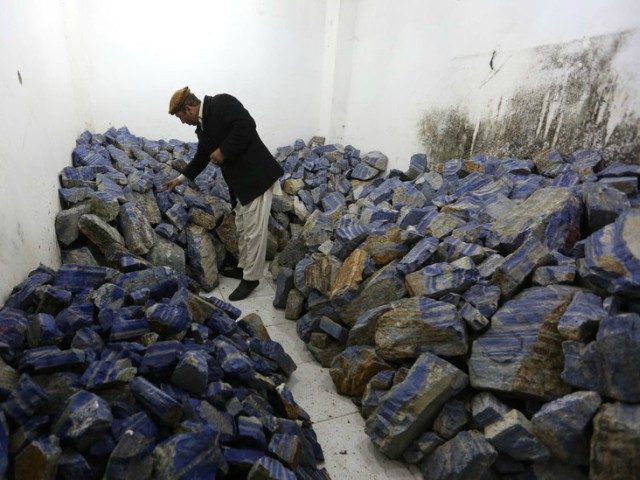U.S. President Donald Trump and his Afghan counterpart, President Ashraf Ghani, have expressed support for having American companies mine rare earth mineral resources in war-ravaged Afghanistan, valued by the Pentagon at nearly $1 trillion in 2010.
“They agreed that such initiatives would help American companies develop materials critical to national security while growing Afghanistan’s economy and creating new jobs in both countries, therefore defraying some of the costs of United States assistance as Afghans become more self-reliant,” declared the White House in a statement.
Citing officials from inside and outside the U.S. government in July, the New York Times (NYT), reported that the Trump administration has discussed the prospect of harnessing Afghanistan’s mineral resources with Ghani who has promoted mining as an economic opportunity for his country, considered one of the poorest in the world.
The two leaders reportedly continued their discussion during a meeting in New York, confirming their mutual interest in extracting the rare earth minerals.
While the United States has invested an estimated $714 billion since the war started in Afghanistan in October 2001, including about $120 billion in nation-building efforts alone, it is neighboring China that has been tapping into what is believed to be one of the richest troves of minerals in the world.
“After 16 years in Afghanistan, the U.S. is looking for ways to offset the billions of dollars spent every year in propping up the government in Kabul and mining is increasingly being seen as a way to do that,” reports Reuters.
Using aerial surveys conducted in 2006, the U.S. Geological Survey (USGS) has determined that Afghanistan may hold millions of tons of useful minerals that the U.S. Department of Defense’s Task Force for Business and Stability Operations estimated in 2010 to be worth $908 billion.
However, deteriorating security conditions, primarily at the hands of the Afghan Taliban, and a lack of reliable transportation infrastructure have proven to be hurdles to mining the material.
“A lack of even basic transport and industrial infrastructure, as well as a growing insurgency that has taken almost half the country out of government control, has meant minerals have been impossible to exploit economically,” acknowledges Reuters.
Terrorists, primarily the Taliban, controlled or contested an estimated 40 percent of Afghanistan as of May 2017, reported a U.S. watchdog agency.
“Prices of some rare earths have shot up recently as demand for electric vehicle technology has grown, fueling some talk that their value could compensate for the higher risks in getting them out of the ground,” points out Reuters.
The majority of the mineral deposits are believed to be in the Taliban-stronghold of Helmand, the largest Afghan province in size, located along the Pakistan border.
Communist China, which shares a border with Afghanistan, has reportedly reached an agreement with the Taliban that allows Beijing to mine Afghanistan without worrying about security.
A state-owned Chinese mining company has already signed a 30-year, $3 billion contract with the Afghan government to exploit the country’s copper deposit.
China dominates the rare earth mineral sector, prompting “concern in Washington that Beijing has a stranglehold on raw materials vital to modern defense technology and prompting an interest in finding alternative sources,” notes Reuters.
Some analysts have questioned the feasibility of developing Afghanistan’s reserves of rare earth minerals.
Attempting to extract rare earths in Afghanistan at the moment “makes no sense on almost any level” unless carried out as a component of the government-funded nation-building efforts in the country, Mike Harrowell, an analyst at the Australia-based research firm Harwind, told Reuters.
“It’s not a simple business, and the technology is quite tightly held. It costs a lot,” he added. “There are so many well-studied projects in North America that were assessed during the rare earths boom after 2010 that still require funding. You would [have to] do any of those projects before you’d do one in Afghanistan.”
Meanwhile, chemical executive Michael N. Silver, who has discussed the potential of mining in Afghanistan with the Trump administration, believes the effort is worthwhile.
Silver’s company, American Elements, specializes in the minerals found in Afghanistan.
During his meeting with Trump in New York, the Afghan president also expressed his “commitment to fully implementing President Trump’s new South Asia strategy to defeat terrorism and ensure the safety and security of the American and Afghan people,” noted the White House.
President Trump has decided to escalate the U.S. involvement in the ongoing war to reverse the chaotic security situation he inherited from his predecessor.
The president has authorized the deployment of 3,000 additional American forces that will bring the total number of U.S. troops in the war-devastated country to about 14,000.
Both Trump and Ghani were in New York to attend the United Nations General Assembly’s annual debate.

COMMENTS
Please let us know if you're having issues with commenting.